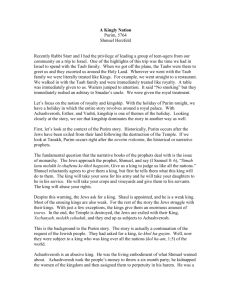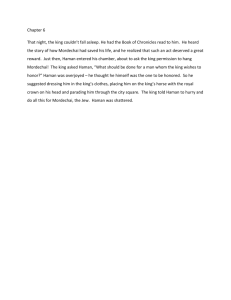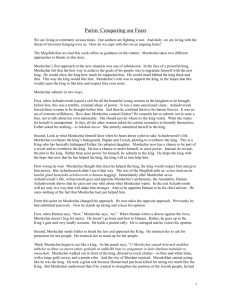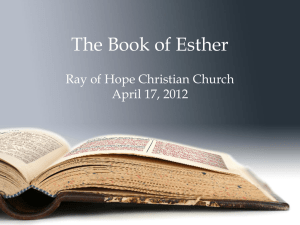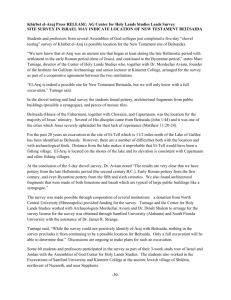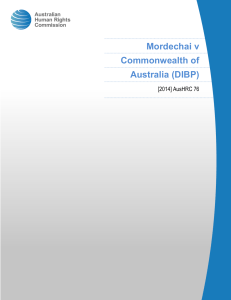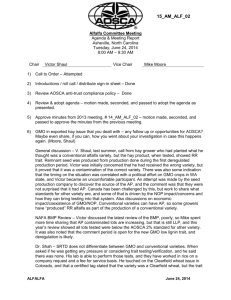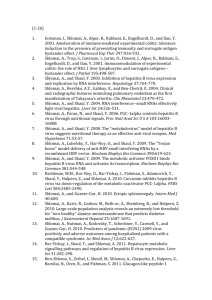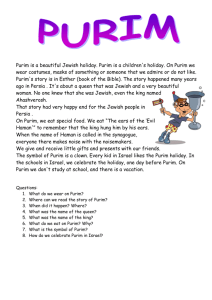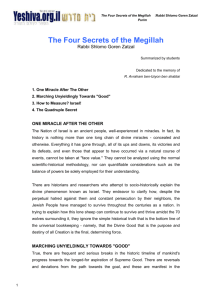Book of Esther: An Analysis
advertisement
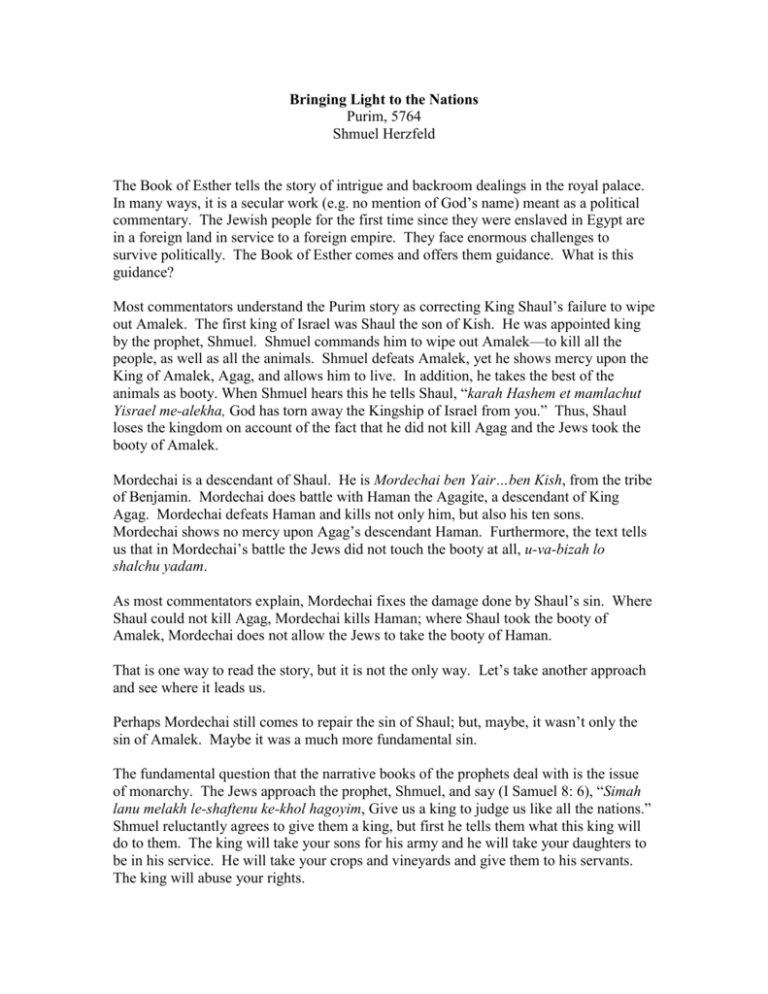
Bringing Light to the Nations Purim, 5764 Shmuel Herzfeld The Book of Esther tells the story of intrigue and backroom dealings in the royal palace. In many ways, it is a secular work (e.g. no mention of God’s name) meant as a political commentary. The Jewish people for the first time since they were enslaved in Egypt are in a foreign land in service to a foreign empire. They face enormous challenges to survive politically. The Book of Esther comes and offers them guidance. What is this guidance? Most commentators understand the Purim story as correcting King Shaul’s failure to wipe out Amalek. The first king of Israel was Shaul the son of Kish. He was appointed king by the prophet, Shmuel. Shmuel commands him to wipe out Amalek—to kill all the people, as well as all the animals. Shmuel defeats Amalek, yet he shows mercy upon the King of Amalek, Agag, and allows him to live. In addition, he takes the best of the animals as booty. When Shmuel hears this he tells Shaul, “karah Hashem et mamlachut Yisrael me-alekha, God has torn away the Kingship of Israel from you.” Thus, Shaul loses the kingdom on account of the fact that he did not kill Agag and the Jews took the booty of Amalek. Mordechai is a descendant of Shaul. He is Mordechai ben Yair…ben Kish, from the tribe of Benjamin. Mordechai does battle with Haman the Agagite, a descendant of King Agag. Mordechai defeats Haman and kills not only him, but also his ten sons. Mordechai shows no mercy upon Agag’s descendant Haman. Furthermore, the text tells us that in Mordechai’s battle the Jews did not touch the booty at all, u-va-bizah lo shalchu yadam. As most commentators explain, Mordechai fixes the damage done by Shaul’s sin. Where Shaul could not kill Agag, Mordechai kills Haman; where Shaul took the booty of Amalek, Mordechai does not allow the Jews to take the booty of Haman. That is one way to read the story, but it is not the only way. Let’s take another approach and see where it leads us. Perhaps Mordechai still comes to repair the sin of Shaul; but, maybe, it wasn’t only the sin of Amalek. Maybe it was a much more fundamental sin. The fundamental question that the narrative books of the prophets deal with is the issue of monarchy. The Jews approach the prophet, Shmuel, and say (I Samuel 8: 6), “Simah lanu melakh le-shaftenu ke-khol hagoyim, Give us a king to judge us like all the nations.” Shmuel reluctantly agrees to give them a king, but first he tells them what this king will do to them. The king will take your sons for his army and he will take your daughters to be in his service. He will take your crops and vineyards and give them to his servants. The king will abuse your rights. Despite this warning, the Jews ask for a king. Shaul is a weak king. But, most of the kings are weak. In the end, the Temple is destroyed, the Jews are exiled, and they end up as subjects to Achashverosh. This is the background to the Purim story. The story is actually a continuation of the request of the Jewish people. They had asked for a king, ke-khol ha-goyim. Well, now they were subject to a king who was king over all the nations (kol ha-am, 1:5) of the world. Achashverosh was the living embodiment of what Shmuel warned about. Achashverosh took the people’s money to throw a six month party; he kidnapped the women of the kingdom and then assigned them to perpetuity in his harem. He was a king who made evil decrees and invented harsh, new laws. He was an evil, cruel, calculating king. The Jewish people told Shmuel, ve-hayinu gam anakhnu ke-khol ha-goyim, we want to be just like all the nations. Be careful what you ask for, because this is exactly what they got. They were now in a secular kingdom being ruled over by a king who was ruler of all the nations. The great mistake that the Jewish people made—the mistake that led to their exile—was that they asked for a king like all of the nations. The first king they appointed was Shaul. Mordechai’s role as a descendant of Shaul was to reverse this giant mistake. Consider the following: Mordechai is in many ways the anti-king. He is the gadfly. He is the political outsider who sits at the gate of the king. He refuses to listen to the king and publicly violates his commandments (over et mitzvat hamelekh, 3:3). He is much smarter than the king and in fact the king owes his life to him. Mordechai is offered the opportunity to join the royal palace. Esther sends garments to clothe Mordechai, va-tishlach begadim le-halbish et Mordechai. In the Bible to dress someone in garments is a sign of kingship. Esther wants Mordechai to become a king or a prince. Instead, Mordechai willingly tears his garments. Tearing garments in the Bible is a symbol of losing royal power. Saul knows he has lost the kingdom for good once David tears his garment. On his own accord, Mordechai disdains the kingship; he wants no part of it. Even at the end of the story when he becomes powerful, Mordechai still has no interest in setting up his own kingdom. Shaul is ultimately replaced by David; Mordechai is also figure who replaces Shaul. In fact, Mordechai is described as dod Esther, the uncle of Esther; but the word dod (daled vav daled) is sometimes spelled exactly the same way as the word David. Mordechai is the David-like savior who has arrived on the scene to replace Shaul. He has come to clean up the great mistake of the Jewish people. Ultimately, Purim is a holiday where we are fixing the sin of wanting our government to be ke-hol ha-goyim, like all the nations. We are not like all the nations. We have our own mission and our own responsibilities. We should not judge ourselves by the standards of others. We should not be ke-khol hagoyim, but or lagoyim, a light onto the nations. The message of Purim is that as Jews we have higher responsibilities, and we must hold ourselves to higher standards. As the end of the meggillah states, Layehudim haitah orah, From the Jews there was light. Only once we root out the desire of being like all the nations will we be able to bring light to the nations. The message of Purim is to replace the desire of ke-kkhol hagoyim with the dream of or lagoyim.
